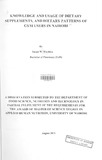| dc.description.abstract | Little has been documented about use of dietary supplements in Kenya despite their increase
in popularity. Hence a study was conducted to provide information on prevalence of dietary
supplements use, knowledge and hence consumption patterns among the gym users in
Nairobi.
A descriptive cross sectional survey was carried out among 402 adult gym users from
nineteen gyms located in Nairobi in November 2010. Data were collected on the socio-demographic
characteristics of the respondents, general knowledge on dietary supplements,
prevalence of use of dietary supplements, types of dietary supplements taken, meals intake
relative to dietary supplements intake, adverse effects of dietary supplements, source of
information on dietary supplements use, sources of dietary supplements, prescription used to
source dietary supplements, anthropometric measurements and food frequency using an
interviewer administered questionnaire ..
The overall prevalence of use of dietary supplements was 43.3%, most popular being body
building among the males and single mineral among the females. Prevalence of
vitamin/mineral supplements use among the females was 62.7% and that of non vitamin/non
mineral use was 78.3% among the males.
The level of knowledge on dietary supplements (OR=2.81, CI=1.73-4.55, P<0.001) and
knowledge about presence of adverse effects of dietary supplements (OR=1.90, CI=1.34-
2.59, P<0.001) were significantly related to use of dietary supplements.
The primary source of information on dietary supplements was relatives/peers among the
males and physician/hospital for the females. The source of dietary supplements was mainly
from the pharmacies/chemists and they were sourced using self prescriptions. 10.9% of the dietary supplement users experienced adverse effects after using the
supplements but only 36.8% of them stopped using them. Some of the adverse effects
included palpitations, liver problems, temper and mood swings, coloured urine, lethargy and
dizziness, stomach problems, nausea, increased appetite and lack of sleep.
The respondents tended to use balanced and healthy diets with more than 75% using fruits
and vegetables daily and consuming some foods considered unhealthy moderately.
About only two fifths of the respondents had a body mass index within the normal range
(18.5kg/m2-24.9kg/m2) with no difference between the genders. The percent body fat was
significantly different between the genders with more males being in the normal range than
females (X2=55.1, P<0.001).
The factors associated with dietary supplements use were alcohol intake, knowledge about
dietary supplements and their adverse effects.
In conclusion, the study shows that there was an independent significant association between
use of dietary supplements and the following characteristics: alcohol consumption: level of
knowledge on dietary supplements; and knowledge about adverse effects of dietary
supplements. The gym users have not achieved their goal of being healthy and fit since there
was a high proportion of them out of the normal body mass index range although their diet
was healthy. There were some adverse effects that were associated with the use of dietary supplements. | en |

